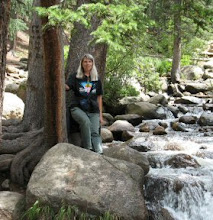Emmett (Natural Patriot) reminds us of an admonition by the famous 19th century naturalist Louis Agassiz that we need to "Study nature, not books," and he and Agassiz are absolutely right. I think it was J. Henri Fabre who once said "I spent the summer traveling... I got halfway across my backyard," or words to that effect. An appropriate sentiment and aspiration for any naturalist.
The same sentiment about books, perhaps more familiar, comes from a patron poet of naturalists, William Wordsworth, exemplar of the Romantic tradition.
Books! 'tis a dull and endless strife:Romanticism was, in large part, a reaction to the Age of Reason that took hold and prevailed to give us the Science we know today. Rather than taking Nature's mechanisms apart by force to understand their workings, as Newton and other scientists preferred, we had only to listen to the wisdom of Her sweet music.
Come, hear the woodland linnet;
How sweet his music! on my life,
There's more of wisdom in it.
One impulse from a vernal woodAttempting to reconcile Nature and Man, Romantic poets sought and saw in Nature not only understanding, but moral lessons relevant to the life of the individual and society.
May teach you more of man,
Of moral evil and of good,
Than all the sages can.
Come forth into the light of things,Ultimately, in the Romantic view, Nature would give up her secrets more willingly to intuition and respect, to those who watched and received. I suspect that's why many of us, on encountering the Romantic poets, felt we'd discovered kindred spirits. Reason still seeks to understand, but poetry, like Nature, leaps directly into our hearts.
Let Nature be your teacher.
Enough of Science and of Art;
Close up those barren leaves;
Come forth, and bring with you a heart
That watches and receives.
——
Post title and quotes are from the poem The Tables Turned, by William Wordsworth, 1798. To explore further, see also Lines Written in Early Spring and The World is Too Much With Us.
Addendum: Perhaps I should have cited the poem's first line, "Up, up, my friend, and quit your books" to explain the post title and stimulate discussion. I read this as a reminder to check in with the original source, not a recommendation from me (or Wordsworth) to give up books entirely. Thanks, Matt, for your insightful comment on the dearth of mentors—let's take that up in a future post.
"Romantic" as related to this discussion

1 comment:
I'm commenting not so much to disagree with the sentiment expressed, but to point out a way that books have been very helpful to me. In a culture with a sad lack of personal natural history elders/mentors, through their books, authors are able to play that role. They provide a greater context and allow for a more rapid depth of understanding of those things that I observe outside. For that I am thankful.
Post a Comment